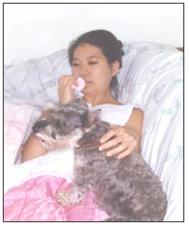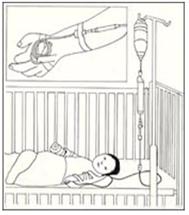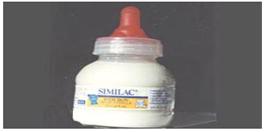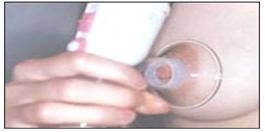수유모가 아플 때, When a nursing mother is sick

사진 2-220. 수유모가 아플 때.
Copyright ⓒ 2012 John Sangwon Lee, MD., FAAP
- 심장병, 신장병, 정신질환, 감염성 질환, 또는 폐결핵 등으로 심하게 앓는 엄마가 모유를 수유하는 것은 때로는 엄마와 아기에게 해로울 수 있다.
- 활동성 결핵 등 박테리아 감염병이나 HIV (바이러스) 감염병 등 병원체 감염으로 감염병을 앓는 엄마가 모유를 수유할 때 엄마에게 감염병을 일으킨 병원체가 젖을 먹는 아기에게도 감염되어 감염병에 걸릴 수 있다.
- 이런 이유로 수유모가 어떤 감염병을 앓을 때는 그 감염병의 종류와 중증도에 따라 모유수유를 일시적으로 또는 완전히 중지해야 할 때도 있다.
- 감기, 기관지염, 또는 인두염 등 바이러스성 상기도 염을 경미하게 앓을 때는 대부분의 수유모는 보통 때 수유하는 것과 같이 모유를 계속 수유할 수 있다.
- 그러나 이런 때도 모유수유를 계속 해도 되는지 의사에게 문의한 다음 의사의 지시에 따라 모유를 수유하는 것이 더 좋다(p.00 면역 참조).
- 물론 이때도, 감염병을 앓는 수유모의 젖을 먹는 아기에게 엄마에게 감염병을 일으킨 바이러스나 박테리아에 감염될 수 있다.
- 수유모가 어떤 감염병 특히 바이러스성 상기도염 등을 앓고 있다고 진단을 받았을 때 감염병을 일으킨 바이러스 병원체가 이미 젖을 먹는 아기에게 감염되어 잠복기 상태에 있는 경우가 대부분이다.
- 수유모가 경미한 바이러스 상기도 염이나 바이러스 위장염 등으로 앓을 때 젖 먹는 아기를 그 수유모로부터 격리시키는 처치는 대부분의 경우 별 효과가 없다.
- 그러므로 그때그때 상황에 따라 결정해야 한다.
- 예를 들면, 수유모가 단순 보통 감기를 경미하게 앓을 때 그 감기를 일으킨 바이러스에 감염되지 않게 수유모로부터 젖 먹는 아기를 격리시키는 치료 방법은 일반적으로 권장하지 않는다.
- 활동성 폐결핵을 앓고 있는 수유모는 아기에게 결핵균을 감염시킬 수 있기 때문에 모유를 수유해서는 안 된다.
- 젖 먹이는 엄마가 폐결핵을 처음으로 진단 받은 후에는 폐결핵의 증상 징후가 경미해도 아기에게 모유를 수유하지 말라고 권장한다.
- 에이즈를 앓는 엄마는 아기에게 모유를 수유해서는 안 된다. Antiretroviral 등 항 바이러스제로 에이즈 치료를 받고 있는 엄마의 젖을 먹는 아기에게 에이즈 바이러스가 감염될 가능성이 적다는 연구도 있다(출처-Infectious Diseases In Children, November 2004).
- 수유모가 어떤 병으로 병원 입원치료를 받고 있거나 집에서 앓고 있을 때 아기에게 모유수유를 계속 해도 되는지 의사에게 문의해 엄마젖을 먹여도 되는지 알아봐야 한다([부모도 반의사가 되어야한다-소아가정간호백과]-제 7권 소아청소년 감염병-결핵 참조).
- 전신 마취 하 수술을 받은 후 전신마취에서 깨어난 후 모유를 수유 할 수 있을 정도로 건강한 수유모는 병원 입원 중 아기에게 모유를 수유해도 된다는 병원 규칙이 있으면 모유수유를 입원 중에 할 수 있다.
- 수유모가 수유할 수 있을 정도로 건강하지만 병원 규칙상 병원에서 모유를 수유 할 수 없을 때는 젖을 짜서 그 짠 젖을 젖병에 담아 집에 있는 아기에게 먹일 수 있다.
- 어떤 병으로 젖 먹는 아기가 병원에 입원할 때도 입원한 아기가 젖을 먹을 수 있을 정도로 건강하고 병원 규칙상 모유수유를 병원에서 할 수 있으면 병원에서 모유를 수유한다.
- 그러나 병원 규칙상, 입원한 아기에게 병원에서 젖을 먹일 수 없을 때는 인공영양 등을 먹이든지 집에서 짠 엄마의 젖을 병원에서 먹일 수 있다.
- 아기가 너무 아파서 엄마의 젖을 빨아먹을 수 없는 때도 있다. 아무 것도 경구로 먹을 수 없을 때도 있다. 이럴 때는 젖을 손이나 유축기로 젖을 짜서 냉장고에 보관했다가 나중에 먹일 수 있다.

사진 2-221. 모유를 먹는 아기가 아플 때.
Copyright ⓒ 2012 John Sangwon Lee, MD., FAAP

사진 2-222. 젖을 먹고 자라는 아기 자신이 아프거나 어떤 이유로 엄마의 젖꼭지를 빨아먹을 수 없으면 손이나 젖 짜는 펌프로 젖을 짜서 젖병으로 먹이든지 냉장고에 보관하든지 인공영양을 먹일 수 있다.
Copyright ⓒ 2012 John Sangwon Lee, MD., FAAP

사진 2-223. 수유모가 아프거나 어떤 이유로 모유를 아기에게 직접 수유할 수 없으면 손이나 유축기로 젖을 짜서 젖병에 넣어 그 짠 젖을 젖병으로 먹이든지 냉장고에 보관하든지 젖 대신 인공영양을 먹일 수 있다.
Copyright ⓒ 2012 John Sangwon Lee, MD., FAAP
When a nursing mother is sick

Picture 2-220. When the nursing mother is sick. Copyright ⓒ 2012 John Sangwon Lee, MD., FAAP
• Breastfeeding mothers who are severely ill from heart disease, kidney disease, mental illness, infectious disease, or pulmonary tuberculosis can sometimes be detrimental to both mother and baby.
• When a mother who has an infectious disease caused by a bacterial infection such as active tuberculosis or a pathogen infection such as an HIV viral infectious disease is breastfeeding, the pathogen that caused the infectious disease in the mother may also infect the infant and contract the infectious disease.
• For this reason, when a nursing mother suffers from an infectious disease, she may have to temporarily or completely stop breastfeeding, depending on the type and severity of the infectious disease.
• If you have a mild viral upper respiratory tract infection, such as a cold, bronchitis, or pharyngitis, most nursing mothers can continue to breastfeed as they normally would.
• However, in this case, it is better to ask your doctor if it is okay to continue breastfeeding and then breastfeed as directed by your doctor (see Immunity).
• Of course, even at this time, babies who are breastfed by a nursing mother with an infectious disease may be infected with the virus or bacteria that caused the mother’s infectious disease.
• When a nursing mother is diagnosed with some infectious disease, especially viral upper respiratory tract infection, the viral pathogen that caused the infectious disease is already in the incubation phase of the breastfed baby.
• When a nursing mother is ill with mild viral upper respiratory tract infection or viral gastroenteritis, measures to isolate the nursing infant from the nursing mother are ineffective in most cases.
• Therefore, you have to decide on a case-by-case basis.
• For example, when a nursing mother has a mild common cold, treatment to isolate the nursing infant from the nursing mother to avoid infection with the virus that caused the cold is generally not recommended.
• Breastfeeding mothers with active pulmonary tuberculosis should not breastfeed because they can infect their babies with Mycobacterium tuberculosis.
• After a nursing mother is first diagnosed with tuberculosis, she recommends not breastfeeding her baby, even if the symptoms of tuberculosis are mild.
• Mothers with AIDS should not breastfeed their babies. There is also a study showing that babies who are breastfed by mothers who are receiving AIDS treatment with antiretroviral and other antiviral drugs are less likely to be infected with the AIDS virus (source- Infectious Diseases In Children, November 2004).
• When a nursing mother is hospitalized for a disease or is sick at home, ask her doctor if it is okay to continue breastfeeding her baby and ask her doctor if it is okay to feed her mother’s milk. See Volume 7, Infectious Diseases in Children and Adolescents – Tuberculosis).
• Breastfeeding mothers who are healthy enough to breastfeed after waking up from general anesthesia after surgery under general anesthesia can breastfeed during hospitalization if a hospital rule states that it is okay to breastfeed a baby during hospitalization.
• If a nursing mother is healthy enough to breastfeed, but cannot breastfeed in the hospital due to hospital rules, she can express the milk and pour it into a bottle to feed her baby at home.
• When a nursing baby is admitted to the hospital for any illness if the hospitalized baby is healthy enough to breastfeed and can breastfeed in the hospital according to hospital rules, breastfeed in the hospital.
• However, due to hospital rules, when a hospitalized baby cannot be breastfed at the hospital, she may be fed artificial nutrition or mother’s milk from her home at the hospital.
• There are times when the baby is too sick to suck on her mother’s milk. Sometimes she can’t eat anything orally. In this case, you can express her milk by hand or with a breast pump, store it in the refrigerator, and feed it later.

Picture 2-221. When a breastfed baby is sick. Copyright ⓒ 2012 John Sangwon Lee, MD., FAAP

Picture 2-222. If the breastfeeding baby herself is sick or is unable to suck her mother’s nipples for some reason, she can be fed artificial nutrition by expressing milk with her hand or a milking pump, bottle-fed or stored in the refrigerator. Copyright ⓒ 2012 John Sangwon Lee, MD., FAAP

Picture 2-223. If the nursing mother is sick or for some reason unable to breastfeed her baby directly, you can express milk by hand or with a pump, put it in a bottle, feed the expressed milk in a bottle, store it in the refrigerator, or give artificial nutrition instead of milk. Copyright ⓒ 2012 John Sangwon Lee, MD., FAAP
출처 및 참조문헌
- www.drleepediatrics.com 제1권 소아청소년 응급 의료
- www.drleepediatrics.com 제2권 소아청소년 예방
- www.drleepediatrics.com 제3권 소아청소년 성장 발육 육아
- www.drleepediatrics.com 제4권 모유,모유수유, 이유
- www.drleepediatrics.com 제5권 인공영양, 우유, 이유식, 비타민, 미네랄, 단백질, 탄수화물, 지방
- www.drleepediatrics.com 제6권 신생아 성장 발육 육아 질병
- www.drleepediatrics.com제7권 소아청소년 감염병
- www.drleepediatrics.com제8권 소아청소년 호흡기 질환
- www.drleepediatrics.com제9권 소아청소년 소화기 질환
- www.drleepediatrics.com제10권. 소아청소년 신장 비뇨 생식기 질환
- www.drleepediatrics.com제11권. 소아청소년 심장 혈관계 질환
- www.drleepediatrics.com제12권. 소아청소년 신경 정신 질환, 행동 수면 문제
- www.drleepediatrics.com제13권. 소아청소년 혈액, 림프, 종양 질환
- www.drleepediatrics.com제14권. 소아청소년 내분비, 유전, 염색체, 대사, 희귀병
- www.drleepediatrics.com제15권. 소아청소년 알레르기, 자가 면역질환
- www.drleepediatrics.com제16권. 소아청소년 정형외과 질환
- www.drleepediatrics.com제17권. 소아청소년 피부 질환
- www.drleepediatrics.com제18권. 소아청소년 이비인후(귀 코 인두 후두) 질환
- www.drleepediatrics.com제19권. 소아청소년 안과 (눈)질환
- www.drleepediatrics.com 제20권 소아청소년 이 (치아)질환
- www.drleepediatrics.com 제21권 소아청소년 가정 학교 간호
- www.drleepediatrics.com 제22권 아들 딸 이렇게 사랑해 키우세요
- www.drleepediatrics.com 제23권 사춘기 아이들의 성장 발육 질병
- www.drleepediatrics.com 제24권 소아청소년 성교육
- www.drleepediatrics.com 제25권 임신, 분만, 출산, 신생아 돌보기
- Red book 29th-31st edition 2021
- Nelson Text Book of Pediatrics 19th- 21st Edition
- The Johns Hopkins Hospital, The Harriet Lane Handbook, 22nd edition
- 응급환자관리 정담미디어
-
소아가정간호백과–부모도 반의사가 되어야 한다, 이상원
-
Neonatal Resuscitation American heart Association
-
Neonatology Jeffrey J.Pomerance, C. Joan Richardson
-
Pediatric Resuscitation Pediatric Clinics of North America, Stephen M. Schexnayder, M.D.
-
Pediatric Critical Care, Pediatric Clinics of North America, James P. Orlowski, M.D.
-
Preparation for Birth. Beverly Savage and Dianna Smith
-
Infectious disease of children, Saul Krugman, Samuel L Katz, Ann A. Gershon, Catherine Wilfert
- 소아과학 대한교과서
- Other
Copyright ⓒ 2015 John Sangwon Lee, MD., FAAP
“부모도 반의사가 되어야 한다”-내용은 여러분들의 의사로부터 얻은 정보와 진료를 대신할 수 없습니다.
“The information contained in this publication should not be used as a substitute for the medical care and advice of your doctor. There may be variations in treatment that your doctor may recommend based on individual facts and circumstances. “Parental education is the best medicine.”